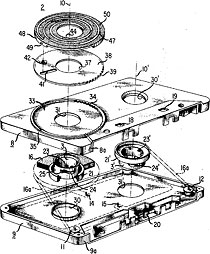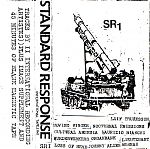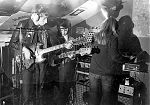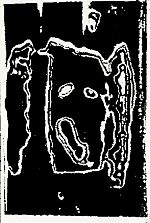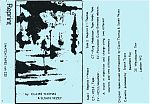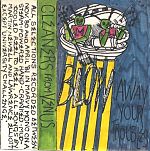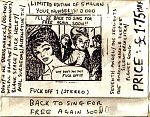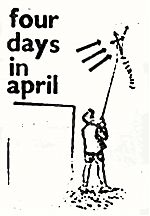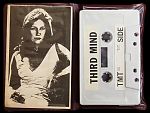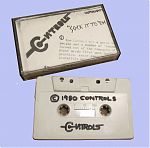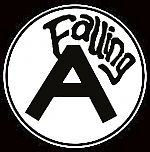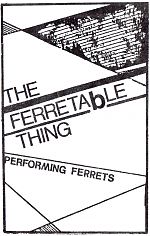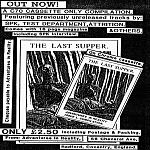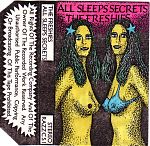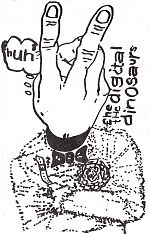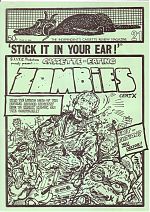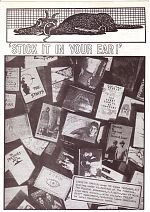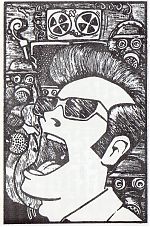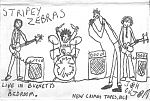Lost gems From The UK Scene by Tim Naylor
This article was written by Tim Naylor and used in an abbreviated form in The Record Collector, a British music publication . I saw Tim’s name on The UK scene on facebook and posted there. He got in touch and I asked him to write an intro and also include the full article he had written. First, the intro about him setting up his own label, Stupid Rabbit Tapes.
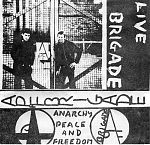
The APF Brigade live. An early project of Andy Xport, who later had the group, Man’s Hate ( and still going strong with solo recordings)
How to set up a label by accident – Stupid Rabbit Tapes
Tim Naylor writes:
“In late 79, I wrote to Sounds (national UK music magazine) announcing our band ‘Controls’ had released an independent cassette on Stupid Rabbit Tapes called ‘Sock it to ‘em, Dave’ which could be bought for £1 from my home address. Sounds put a small report on their news page in the New Year and in days I was receiving offers for distribution, publishing, fanzine interviews and punters sending in their £1 payments… unfortunately I had nothing to send them as the tape didn’t actually exist.”
“Armed with a fistful of orders, Jon Monks (rhythm guitar) and I spent hours one Sunday going through old rehearsal tapes and by the end of the day cobbled together the 4 tracks that made up the ‘Sock it to ‘em, Dave’ ep. We added an intro of someone heckling at the band’s first gig and an outro lifted from a Star Trek episode. Jon was the only one of us with any equipment (two Philips portable cassette recorders and a dodgy DIN lead) so he got the short-straw of doing the copies – all in real time and into the wee small hours as the flood of orders and industry requests for demo tapes refused to diminish.”
“Amazingly, the tape was highly rated by a number of fanzines including Cultural Revolution and Stick it in your Ear. The sound quality is pretty poor but there’s a ton of energy and enthusiasm which obviously struck a chord somewhere and we sold 500 copies of the tape.”
“Flushed with success, we decided to repeat the feat and issued a longer, 10-track album on Stupid Rabbit Tapes in July 1980. ‘Don’t Adjust the Controls’ featured ten tracks captured live at our rehearsal studio (a sports pavilion in Fleet, Hampshire) and mixed via two microphones to a professional cassette deck. Around 100 copies were sold of this tape, mostly on mail order.”
“The overwhelming response we got to ‘Sock it to ‘em, Dave’ diminished significantly with each subsequent release, even though they were only a matter of months apart. Something perceived as cutting edge at the start of 1980 had become the norm for unsigned bands in just 6 months. However, the key thing was that it gave us the oxygen of publicity and some critical attention outside of our own small backwater.”
“A third Controls tape featuring tracks by a ‘new’ version of the band was issued in 1981 on Stupid Rabbit Tapes as ‘Late Night Love (in a Launderette)’ (SRT 003).”
“We then formed an alliance/friendship with the Reading-based X-Cassettes label. This label issued a Controls compilation called ‘Dance’ (X-003). The band also appear on two X-Cassette compilations – ‘Anything Could happen in the next half hour’ (X-002) and ‘Bits’ (X-005).”
“Another interesting by-product was bands started sending us their tapes to put out on Stupid Rabbit Tapes – a five track demo from Religious Overdose (from Northampton UK) was eventually issued by X-Cassettes as ‘First Demo’ (X-004, 1981). The following year, Japanese eccentric Naofumi Ishimaru (Yximalloo) sent me a tape asking if I could release it on Stupid Rabbit Tapes – interestingly this tape (Be Young! Be Foolish! Be Poor! Be Inconvenient! Sakura Records Y-6915) appears on no listings or discographies about the band.”
“In 81 Jon and I formed a new band Beating Hearts – recording for X-Cassettes and appearing on the Beyond the River vinyl LP (Open Door Records 1982) before reviving Controls in the mid-80s and issuing around a dozen tapes on Stupid Rabbit.”
“We learnt our lessons well and the label became part and parcel of whatever bands Jon and I were involved in – if only to help us promote what we were doing. We really hit our stride in 1984/85 putting out a tape every couple of months with a new line-up of Controls featuring Tracy Darlington on lead vocals. We even broke into the pages of the industry rag Music Week on a number of occasions which goes to show a well-honed press release can have just as much effect as a well-recorded demo…”
“Stupid Rabbit stopped issuing tapes in the mid-1990s, but I kept copies of everything – from tapes to fanzines. A few years ago I started converting the old tapes we issued to MP3 format and issued a couple of low-run CDs. It also piqued my interest in researching the ‘golden era’ of the cassette-culture era – late 70s and early 80s – that we had been part of. I pitched an idea for a feature on the early UK cassette pioneers to the editor of Record Collector in the UK. It was accepted and resulted in a 5,000 word article published in October 2011 – believed to be the first time that period had been documented in a national music magazine in the UK.”
In October 2012, Stupid Rabbit Tapes licensed a digital version of Keine Namen’s ‘The Bedroom Tapes’ to Year Zero Records, who described it as: “Something akin to a lost fragment of the Rosetta Stone of DIY Punk.Three chord thrash re-animated as Zero note dirges, or rather a case of playing the right wrong notes. Imagine the bastard offspring of Half Japanese, The Shaggs, and The Prats, and you’d be half way there. True Year Zero music.”
Stupid Rabbit Releases:
‘Sock it to ‘em, Dave’ 4 track EP Controls – SRT001 1980
‘Don’t Adjust the Controls’ 8 Track LP Controls – SRT002 1980
‘Late Night Love Songs’ 10 Track LP Controls – SRT003 1981
‘Retrospective Jealousy’ 3 track EP Beating Hearts SRT004 1982
‘Love Beat Kid … On the Nod’ 20 track LP Beating Hearts SRT005 1983
‘Searching for the Perfect partner’ 10 track live LP Controls SRT006 1984
‘Dress, Dance, Demand and Desire’ 7 track LP Controls SRT007 1984
‘I didn’t know you were leaving’ 5 track EP Controls SRT008 1984
‘The Good Thing’ 4 track EP Controls SRT009 1984
‘Keep Me Here’ 3 track Cassingle Controls SRT010 1984
‘Love You More’ 4 track Cassingle Controls SRT011 1985
“always will…” 4 track Cassingle Controls SRT012 1985
“Let’s all bark like Labradors!” 15 track live LP Controls SRT013 1985
‘Ooer missus it’s the…’ 6 track Handsome Bastards SRT014 1989
‘The South is Rising’ 3 track Handsome Bastards SRT015 1989
‘HBs’ 3 track Handsome Bastards SRT016 1989
‘Crawl, Walk, Run’ Naylor/Monks unreleased demo 1992
‘Punk Rock – The Wilderness Years Vol. 8’ 3 track ep Sweet Hooligan SRT 017 1992
‘Fabulous’ Cassingle Sweet Hooligan SRT 018 1993
‘Sitting Sucking Air ep’ 3 track ep Sweet Hooligan SRT 019 1993
‘All the Girls’ 15 track CD Sweet Hooligan SRTCD001 2005
‘Stupid Rabbit Sings’ 24 track CD Compilation SRTCD002 2011
‘The Bedroom Tapes’ 8 tracks Keine Namen Superbun 1* 1978
Notes in the margins: 21 lost gems from the UK indie cassette scene:
© Tim Naylor 2011
Cassette tapes have become ‘fashionable’ again, with a variety of edgy indie, alternative bands highlighting their credentials by turning to tape to differentiate themselves from the mass of the MP3 and MySpace generation. It may be wilfully Luddite – but with limited runs and early deletions there will undoubtedly be some collectables of the future being created today on C60 and C90 formats.
It’s not the first time cassettes have been the medium of choice for those on the margins of the UK indie scene, of course. Arguably the final wag of punk’s tail, from 1979 to about 1983, the cassette scene was vibrant and active, defiantly home made, often wilfully obscure and little chronicled. As a result, however, this part of the UK’s musical heritage remains largely unknown or is fast being forgotten.
That would be negligent in extreme, because the scene was a fertile breeding ground for all sorts and styles of musical endeavour. While no-one would argue it shaped the next decade of pop, it did set the ground rules of independent music – sharing, swapping, networking – and kept the ‘just do it’ punk attitude very much alive. Plus without indie cassettes, we’d have had no C-81, and therefore no C-86, which in turn lit the blue touch paper of Brit-pop.
Geoff Wall, arguably the leading chronicler of the early cassette culture through the publication of Stick it in you Ear fanzine highlights the vibrancy of the early scene, saying “It can now be seen as a continuation of Punk’s Do-It-Yourself ethic. The cassette was adopted by people who produced every conceivable type of music at a grass-roots level.”
He added “It was ideal for distributing little-known, or minority interest music, as any taped performance was copied in small or large numbers, easily and as required. No expensive record cutting or complex manufacturing processes were needed, and many people simply copied them to order, sold them at gigs or through specialist shops, or via mail order. The cheapness of cassettes not only gave excellent value for money, but provided an alternative forum, that was accessible to everybody. Some bands even bought bargain-bin cassettes, placed sellotape over the lug, and recorded their music over the original album. Now that’s recycling!”
When it came to promoting tapes, there was a competitive established music press – NME, Sounds, Melody Maker, Zig Zag – all eagerly looking for the next music trend and who all (eventually) supported the indie tape scene in one way or another. There was also an extensive regional independent fanzine network, desperate for something to write about beyond what was happening in their own back yard.
Wall added “Another interesting aspect of the ‘DIY Scene’ as it became commonly known, was the way in which it got people communicating and a sort of world-wide pen pal social network developed. Indeed this was even encouraged by many artists preferring to swop their tapes for other people’s work. The medium offered the musician considerable exposure, while retaining both their independence and freedom, giving the listener access to a wealth of original and interesting music.”
Once the word was out, distribution was easy via direct mail and at gigs, while many independent record shops were happy to take a few tapes by the local band heroes on a sale or return basis. Everything was in place and a few grasped the nettle to set up their own labels, releasing home and porta-studio recorded material that would appeal to nearly every musical palate, with folkies, poets, singer-songwriters, post-punk, oi, industrial, ambient, electronic, anarchic and all kinds of ‘alternative’ and ‘prog’ rock on offer. Admittedly there was also plenty of self-indulgent rubbish as well, but arguably that just added to the charm.
The artwork adorning cassette sleeves and inserts from this period was equally home-grown and the general rule of thumb was ‘hand drawn is best’ and, more often than not, a quick doodle or hand-scrawled logo on the cover would suffice. Even reproduction of sleeves and inserts was made easy as photocopiers became more mainstream in the workplace, colleges and libraries and cheap print shops opened on the high street.
There was also an interesting subtext that this all took place in the shadow of the ‘Home Taping is Killing Music’ campaign. Re-reading the contemporary fanzines of the time, there was a genuine David & Goliath stand-off developing as the indie tape pioneers tackled the forces of the big vinyl producers head-on.
What worried the majors was that they had no control over what appeared to be a very vibrant scene, which by-passed the traditional routes to market completely and often gave away music for free! Most bands were happy to provide a recording of their work for the donation of a C60 and a self-addressed envelope, and that was a complete anathema to the big labels.
There was a genuine feeling that it was time to challenge the ‘established’ musical hierarchy, and the big industry players took this threat very seriously. There were even dark mutterings that NME, Sounds and Melody Maker were quietly told to kill off their indie tape coverage or they would find their record company advertising budgets severely curtailed. Allegedly.
Wall concluded “The heady cassette heydays of 1979-1983 were never repeated here in the UK. Corporate pressure ensured that both vinyl and cassettes were marginalised and that the CD replaced previous platforms. Yes, cassettes did have an inbuilt fragility, such as being chewed-up in tape machines, but for those who made their own music, it is a medium that remains sadly missed.”
